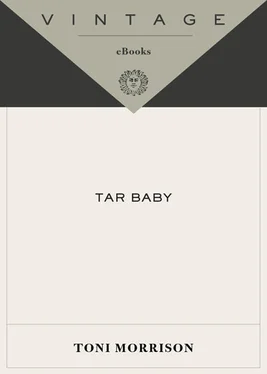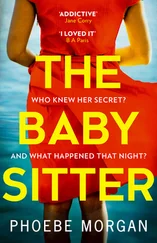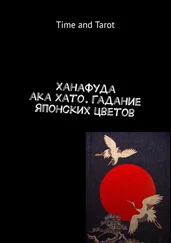Toni Morrison - Tar Baby
Здесь есть возможность читать онлайн «Toni Morrison - Tar Baby» весь текст электронной книги совершенно бесплатно (целиком полную версию без сокращений). В некоторых случаях можно слушать аудио, скачать через торрент в формате fb2 и присутствует краткое содержание. Жанр: Старинная литература, на русском языке. Описание произведения, (предисловие) а так же отзывы посетителей доступны на портале библиотеки ЛибКат.
- Название:Tar Baby
- Автор:
- Жанр:
- Год:неизвестен
- ISBN:нет данных
- Рейтинг книги:3 / 5. Голосов: 1
-
Избранное:Добавить в избранное
- Отзывы:
-
Ваша оценка:
- 60
- 1
- 2
- 3
- 4
- 5
Tar Baby: краткое содержание, описание и аннотация
Предлагаем к чтению аннотацию, описание, краткое содержание или предисловие (зависит от того, что написал сам автор книги «Tar Baby»). Если вы не нашли необходимую информацию о книге — напишите в комментариях, мы постараемся отыскать её.
Tar Baby — читать онлайн бесплатно полную книгу (весь текст) целиком
Ниже представлен текст книги, разбитый по страницам. Система сохранения места последней прочитанной страницы, позволяет с удобством читать онлайн бесплатно книгу «Tar Baby», без необходимости каждый раз заново искать на чём Вы остановились. Поставьте закладку, и сможете в любой момент перейти на страницу, на которой закончили чтение.
Интервал:
Закладка:
“You make him sound weak, the way you say that. I don’t remember him that way at all.”
“You did know him, didn’t you?” Valerian looked at her with surprise.
“Well, not really know him. I met him twice. The last time when you invited me to spend the summer in Orange County. Remember?” Jadine perked up, animated by her own memory. “My first year at college? He was there and we used to talk. He was…oh…clearheaded—independent it seemed to me. Actually we didn’t talk; we quarreled. About why I was studying art history at that snotty school instead of—I don’t know what. Organizing or something. He said I was abandoning my history. My people.”
“Typical,” said Valerian. “His idea of racial progress is All Voodoo to the People.”
“I think he wanted me to string cowrie beads or sell Afro combs. The system was all fucked up he said and only a return to handicraft and barter could change it. That welfare mothers could do crafts, pottery, clothing in their homes, like the lace-makers of Belgium and voilà! dignity and no more welfare.” Jadine smiled.
“That’s exactly what the world is waiting for: two billion African pots,” said Valerian.
“His intentions were good.”
“They were not good. He wanted a race of exotics skipping around being picturesque for him. What were those welfare mothers supposed to put in those pots? Did he have any suggestions about that?”
“They’d trade them for other goods.”
“Really? Two thousand calabashes for a week of electricity? It’s been tried. It was called the Dark Ages.”
“Well, the pottery wasn’t to be utilitarian.” Jadine was laughing. “It’d be art.”
“Oh, I see. Not the Dark Ages, the Renaissance.”
“It was a long time ago, Valerian. Eight years? Nine? He was just a kid then. So was I.”
“You’ve grown. He hasn’t. His vocabulary, perhaps, but not his mind. It’s still in the grip of that quisling Little Prince. Do you know it?”
“Know what?”
“That book. The Little Prince.”
“No. I never read it.”
“Saint-Exupéry. Read it some time. And pay attention not to what it says, but what it means.”
Jadine nodded. It seemed like a perfect exit line to her, since she didn’t know what he was talking about and didn’t want to pursue his thoughts if they were anything like his eyes at this moment. Without melanin, they were all reflection, like mirrors, chamber after chamber, corridor after corridor of mirrors, each one taking its shape from the other and giving it back as its own until the final effect was color where no color existed at all. Once more she stirred to rise from the table and once more he stopped her, not irritably this time but with compassion.
“Did they trouble you—the things he said that summer?”
“For a while.”
“You knew better?”
“I knew the life I was leaving. It wasn’t like what he thought: all grits and natural grace. But he did make me want to apologize for what I was doing, what I felt. For liking ‘Ave Maria’ better than gospel music, I suppose.”
Nothing on Sydney’s face showed his disappointment that the soufflé had not been completely eaten up by either one of them. He collected the dishes with his look of alert serenity, and stepped through the hair of the maiden aunts with an easy silent tread. He was perfect at those dinners when his niece sat down with his employers, as perfect as he was when he served Mr. Street’s friends. The silver tray of walnuts, the equally silver bowl of peaches he brought in, and a jiffy later, the coffee—all were exactly and surreptitiously placed on the table. One hardly knew if he left the room or stood in some shadowy corner of it.
Jadine leaned her cheek on her fist. “Picasso is better than an Itumba mask. The fact that he was intrigued by them is proof of his genius, not the mask-makers’. I wish it weren’t so, but…” She gave a tiny shrug. Little matches of embarrassment burned even now in her face as she thought of all those black art shows mounted two or three times a year in the States. The junior high school sculpture, the illustration-type painting. Eighty percent ludicrous and ten percent derivative to the point of mimicry. But the American Blacks were at least honestly awful; the black artists in Europe were a scandal. The only thing more pitiful than their talent was their pretensions. There was just one exception: a Stateside Black whose work towered over the weeds like a sequoia. But you could hardly find his stuff anywhere.
“You look sad,” said Valerian. “He must really have made you suffer. You should have mentioned it to me. I wanted that summer to be an especially pleasant one for you.”
“It was. Actually it was good he made me think about myself that way, at that place. He might have convinced me if we’d had that talk on Morgan Street. But in Orange County on a hundred and twenty acres of green velvet?” She laughed softly. “Can you believe it? He wanted us to go back to Morgan Street and be thrilling.”
“Us? He was going with you?”
“Just to get us started. He meant us Blacks: Sydney, Ondine and me.”
“Sydney? A potter?” Valerian turned his gaze toward his butler and laughed.
Jadine smiled but did not look at her uncle.
“You can see how much he knows about Sydney. And I haven’t given you one-thousandth of what I gave him, of what I made available to him. And you have fifty times the sense he does, I don’t mind telling you.” Valerian’s sentences changed tempo. They were slower, and it was taking him longer to blink his eyes. “Margaret did that. She made him think poetry was incompatible with property. She made a perpetual loser of one of the most beautiful, the brightest boy in the land.” He held his forehead for a moment. To Jadine he seemed terribly close to tears and she was relieved when he merely repeated himself. “The most beautiful, the brightest boy in the land.”
“He didn’t turn out the way you wanted?”
“No.”
“You want him to be something else?”
“I want him to be something at all.”
“Maybe he is.”
“Yes. An adolescent. A kitten. But not playful. Complaining. A complaining kitten. Always mewing. Meow. Meow. Meow.”
“You shouldn’t hate him, though. He’s your son.”
Valerian took his hand from his forehead and stared deep into the peaches nestled in their silver bowl. “I don’t hate him. I love him. Margaret thinks I don’t. But I do. I think about him all the time. You know…this isn’t going to sound right…but I never was convinced that she did. Perhaps she did. In her way. I don’t know. But she wasn’t ready for him. She just wasn’t ready. Now, now she’s ready. When it’s over. Now she wants to bake him cookies. See him off to school. Tie his shoelaces. Take care of him. Now. Absurd. I don’t believe it. I don’t believe her. When he was just a little thing I came home one day and went into the bathroom. I was standing there and I heard this humming—singing—coming from somewhere in the room. I looked around and then I found it. In the cabinet. Under the sink. He was crouched in there singing. That was the first time, but not the last. Every now and then I’d come home, he’d be under the sink. Humming to himself. When I’d pull him out, ask him what he was doing there, he’d say he liked the soft. He was two, I think, two years old, looking in the dark for something—soft. Now imagine how many soft, cuddly things he had in his room. Bunny rabbits, slippers, panda bears. I used to try to be it for him, but I wasn’t there during the day. She was though. I sometimes had the feeling that she didn’t talk to him very much, then it would go away. The feeling, I mean. She’d change, she’d get interested in him, read to him, take him to shows, parks. Months would pass. Then I’d come home and he’d be under the sink again, humming that little, I can’t tell you how lonely, lonely song. I wasn’t imagining it; it was lonely. Well, he got older and she’d go hot and cold, in and out. But he seemed to miss her so, need her so that when she was attentive he was like a slave to her. Then she’d lose interest again. When he was twelve he went to boarding school and things were better. Until he came to visit. She would do things—odd things—to get his attention and keep it. Anything to keep his eyes on her. She’d make up things, threats to herself, attacks, insults—anything to see him fly into a rage and show how willing he was to defend her. I watched, and tried to play it down or prove, prove she was making it up. I always checked, it was always nothing. All I ended up doing was making him angry with me. I thought another child—but she said no. Absolutely refused. I have until this day never understood that. When he left for college I was relieved. It was already too late, but I still hoped he’d get out from under her. In a way he has, I suppose. Never visits, seldom writes. Calls sometimes. Complains. About Indians. About water. About chemicals. Meow. Meow. Meow. But he is on his own, I guess. On his own. But now—” Valerian turned to Jadine and stared right at her chin. “Now she wants to get hold of him again. Tempting him with some fake poet. And she wants to go back with him, live near him. For a while she says. Know what that means? A ‘while’? It means as soon as he trusts her again, needs her again, counts on her, she’ll change her mind, leave him. I haven’t seen him for three years, and the last couple of times I didn’t like him, or even know him. But I loved him. Just like I loved the boy under the sink, humming. That beautiful boy. With a smile like…like Sunday.”
Читать дальшеИнтервал:
Закладка:
Похожие книги на «Tar Baby»
Представляем Вашему вниманию похожие книги на «Tar Baby» списком для выбора. Мы отобрали схожую по названию и смыслу литературу в надежде предоставить читателям больше вариантов отыскать новые, интересные, ещё непрочитанные произведения.
Обсуждение, отзывы о книге «Tar Baby» и просто собственные мнения читателей. Оставьте ваши комментарии, напишите, что Вы думаете о произведении, его смысле или главных героях. Укажите что конкретно понравилось, а что нет, и почему Вы так считаете.











